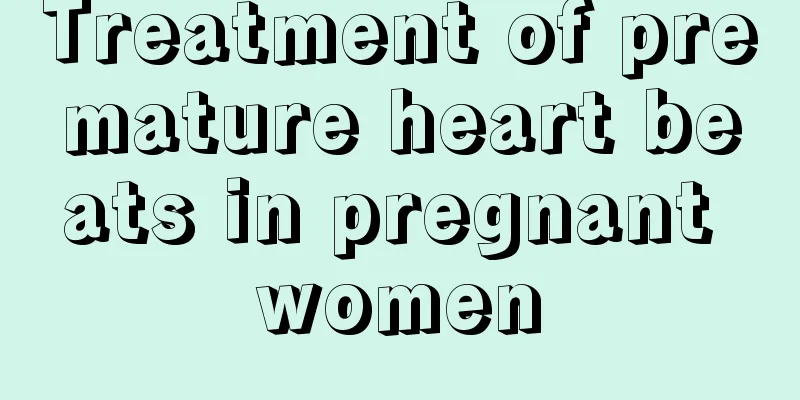Panic and palpitations: Know your heartbeat

|
Panic and palpitations: Know your heartbeat Original author: Dr. Yu Li Have you ever felt a palpitation in your fast-paced life? This feeling may be caused by a variety of reasons, but first, let's understand this phenomenon scientifically. Palpitations usually refer to abnormal heartbeats, which may be manifested as a fast, slow, irregular or strong heartbeat. This feeling may be temporary or continuous. Although in many cases, palpitations are only a temporary discomfort, they may also be a sign of some underlying health problems. There are many common causes of palpitations, including anxiety, stress, excessive caffeine intake, and side effects of medications. At the same time, some physical conditions, such as anemia, thyroid problems, and heart disease, can also cause palpitations. After understanding the causes of palpitations, how can we deal with them scientifically? First, it is important to maintain a healthy lifestyle. A balanced diet, adequate sleep, and regular exercise can help maintain heart health. Secondly, learn to manage and reduce stress. Through meditation, deep breathing, yoga and other methods, anxiety and stress can be effectively relieved. Of course, if the symptoms of palpitations persist or worsen, it is recommended to seek medical attention in time. The doctor will use a series of tests, such as electrocardiograms and blood tests, to determine the specific cause of palpitations and give corresponding treatment recommendations. In the process of palpitations, we must not only understand its causes and coping methods, but more importantly, we must learn to listen to the voice of our own body. Palpitations may be the body telling us that we need more attention and care. Let us use scientific methods to care for our hearts and enjoy a healthy life. So how do you prevent palpitations? Palpitations are a common symptom of heart discomfort. They may manifest as a rapid heartbeat, an irregular heartbeat, a heavy heartbeat, or a feeling that your heart suddenly stops beating. Although palpitations are not usually a sign of a serious illness, they can be disturbing and alarming. Knowing how to prevent palpitations can help you keep your heart healthy and relieve unnecessary worry. 1. Maintain a healthy lifestyle Maintaining a healthy lifestyle is key to preventing heart palpitations. This includes maintaining a proper weight, exercising regularly, eating a balanced diet, and avoiding smoking and limiting alcohol. These habits can help reduce your risk of heart disease and other health problems, which can reduce the occurrence of heart palpitations. 2. Manage stress and anxiety Stress and anxiety are common causes of palpitations. Learning to manage and reduce stress, such as through relaxation techniques, meditation, yoga, etc., can help reduce the risk of palpitations. At the same time, maintaining a good mental state can also help maintain heart health. 3. Control chronic diseases Chronic diseases such as high blood pressure, diabetes, and high cholesterol may increase the risk of heart palpitations. Therefore, actively controlling these diseases and following the doctor's advice for treatment and monitoring are crucial to preventing heart palpitations. 4. Regular medical check-ups Regular checkups can help detect heart problems and other potential health risks early. Through electrocardiograms, blood pressure, and blood tests, your doctor can assess your heart health and provide appropriate advice and treatment. 5. Avoid triggering factors Certain drugs, caffeine, nicotine, and heavy drinking can trigger palpitations. Knowing and avoiding these triggers can help reduce the occurrence of palpitations. In short, preventing palpitations requires multiple approaches, including maintaining a healthy lifestyle, managing stress and anxiety, controlling chronic diseases, regular medical examinations, and avoiding triggers. By following these suggestions, you can reduce the risk of palpitations and keep your heart healthy. If you have any discomfort or concerns, please seek professional advice from your doctor in time. |
<<: Will you get cross-eyed if you play with your phone like this before going to bed?
>>: Fun story: How to slow down skin aging?
Recommend
How to remove the fishy smell below
The odor down there is mostly caused by infection...
How to treat Bartholin gland cyst? It turns out there are two methods
Bartholin gland cyst is medically known as Bartho...
Causes and treatments of bad breath in women
Bad breath is a very embarrassing thing, especial...
What to do if you get pregnant one month after uterine curettage
The neighbor's daughter-in-law had to undergo...
It turns out that eating these kinds of food will stimulate menstruation early
Menstruation is of particular concern to women be...
Is it painful for women to remove the IUD?
Whether women will experience pain during the rem...
No more breast pain at 6 weeks pregnant
The physical conditions of pregnant women are ver...
Is it normal for the vaginal discharge to be a little yellow but without any odor?
I believe that many women have encountered simila...
Is it normal to have no obvious fetal movement at 20 weeks?
For pregnant mothers who do not have obvious feta...
What department should I go to for infertility
Pregnancy is a very happy thing for women and fam...
How to discharge lochia_How to discharge lochia completely
After giving birth, the mother's lower body w...
How to maintain the health of women's private parts
In today's society, a woman's face is eve...
What causes vaginal itching and odor?
Vaginal itching and odor are very painful and emb...









![[Medical Q&A] Some lung cancer patients have undergone lung CT scans. Why do they also need bronchoscopy?](/upload/images/67f0e36b8ac14.webp)